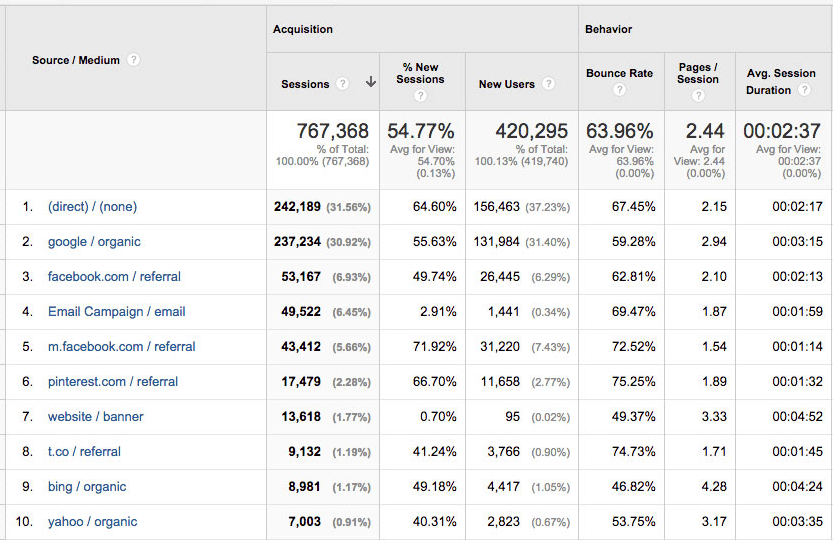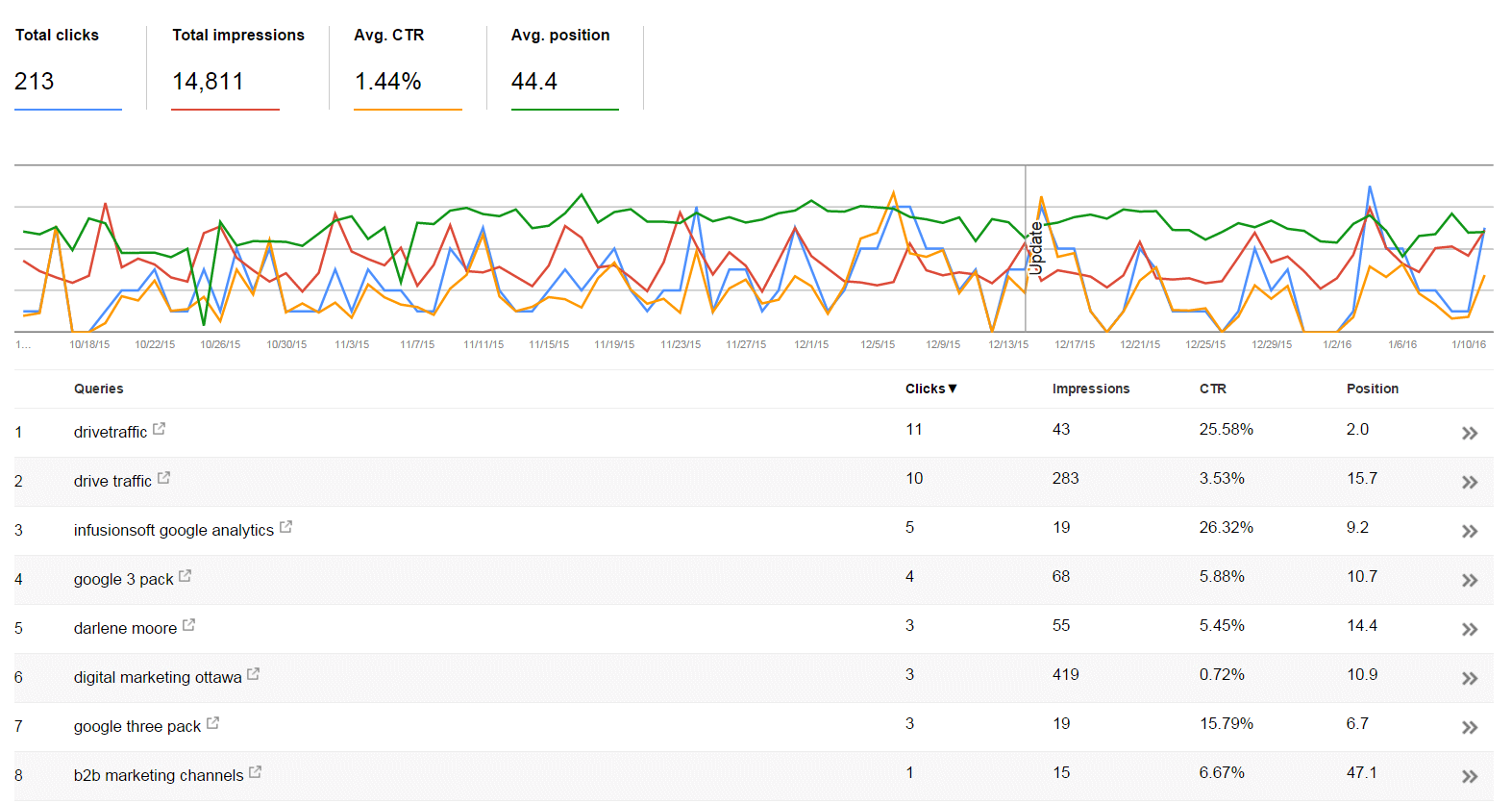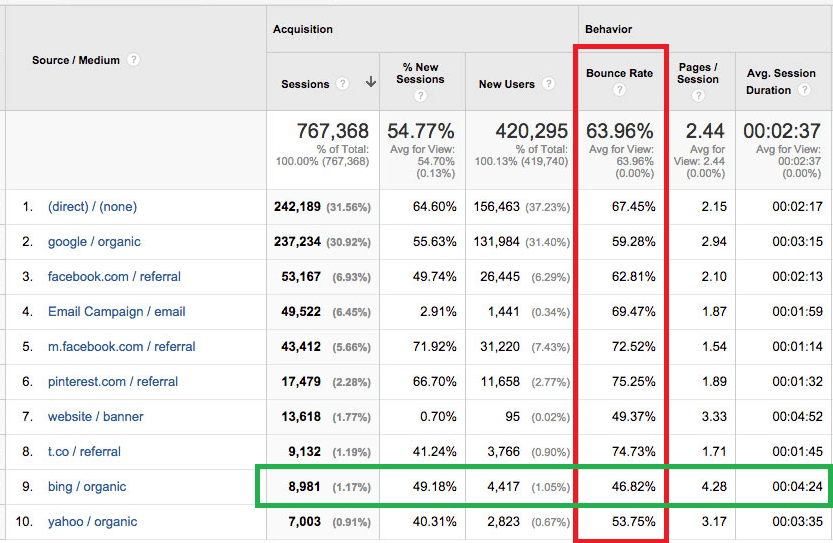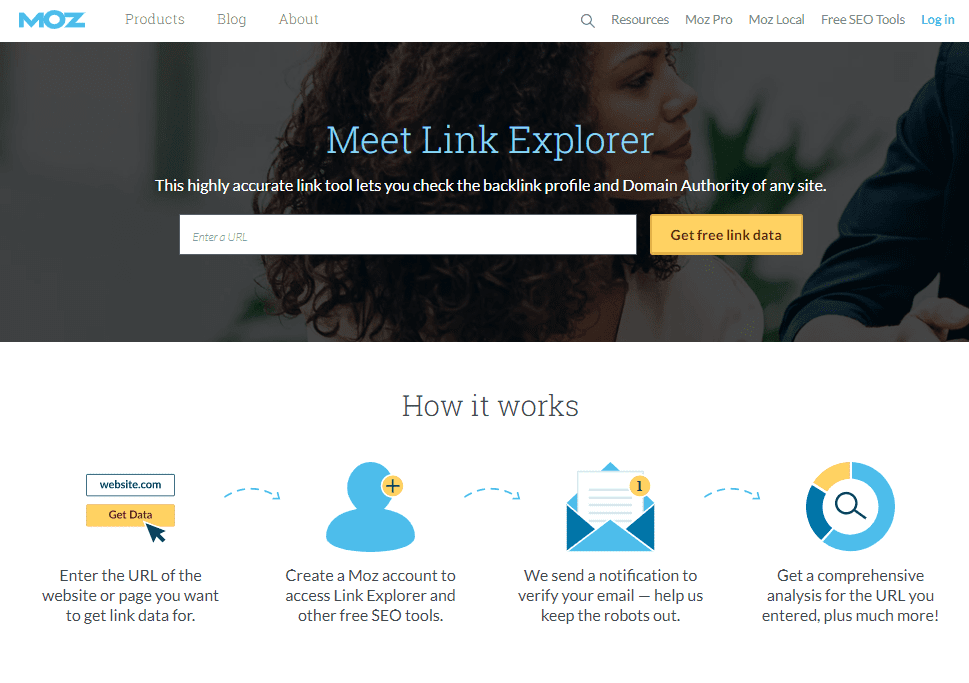Trying to narrow down the most important SEO KPIs that can help you evaluate campaign success?
Any time you start a new marketing campaign, you should always begin by setting clear and measurable goals. Goal setting helps orient your actions towards the desired outcomes of your campaign and provides a means for you to measure campaign success.
One of the best ways to set goals is by using key performance indicators (KPIs) as a measure for project performance. KPIs are metrics whose changing values are used to evaluate the overall success of a marketing campaign.
What are SEO KPIs?
SEO KPIs are digital marketing metrics whose changing value demonstrates how effectively your SEO campaign is meeting its targets.
At Directive, we frequently start a new campaign by identifying a “North Star” KPI. We choose a single KPI that we want to improve, then design campaign strategies focused on improving that single measure of performance. We set KPI goals to help us establish a clear vision for campaign success and to ensure that our strategic marketing approach is aligned with that vision.
With many SEO KPIs to choose from, however, some digital marketers are still confused about which SEO KPIs are the most important and which ones they should focus on improving. To help you set better goals for your campaign and understand the value of tracking and measuring SEO KPIs, we’ve created this guide to the top 7 SEO KPIs that you should be tracking.
Top 7 SEO KPIs You Need to Track
- Organic Traffic by Source
- Organic Traffic by Page
- Organic CTR
- Organic Conversions by Source
- Bounce Rate
- Keyword Rankings
- Domain Authority
Traffic by Source/Medium
Overview: Digital marketers can measure how many users visit a website in a given time period and where those users came from. Common traffic sources including organic (search engines), social media (Facebook, Instagram, etc.), referrals (links on another website), direct traffic (the user typed your website into their browser), and paid search (the user arrived on your site after clicking an advertisement).
Why It’s Important: At the core of nearly every SEO campaign is the objective of increasing web traffic and bringing more visitors to your website, specifically from search engines (organic sources).
How to Keep Track: Install Google Analytics tracking tags on every page of your website to capture traffic source data.

Image: Total sessions and other metrics organized by source/medium on Google Analytics
Organic Traffic by Page
Overview: Digital marketers can segment traffic data even further to see which pages on their website are receiving the most web traffic from organic sources. Some SEO campaigns may focus on increasing organic traffic to a specific page rather than the website as a whole.
Why It’s Important: Increasing traffic to your website is great, but increasing traffic to the right pages on your website is important for long-term value realization. Using organic traffic to a specific page as a KPI ensures that you’re focusing on getting your customers to your highest-converting pages.
How to Keep Track: Install Google Analytics tracking tags on your website, then use reporting features to identify the pages that receive the most organic traffic.
Organic CTR
Overview: Organic CTR is a metric for how frequently users click through to your website when it appears on the search engine results pages. Organic CTR is defined as the total number of clicks on your search result, divided by the total number of impressions in the search engine results pages (SERPs).
Why It’s Important: Search results with a high organic CTR are more likely to rank highly in search results.
How to Keep Track: Setting up Google Search Console for your website will allow you to see the keywords that your website ranks for and your total impressions and clicks for each keyword.

Image: Clicks, Impressions, & CTR by position for search queries on Google Search Console
Conversions by Source/Medium
Overview: If the goal of your SEO campaign is to increase conversions, you may want to evaluate success using total conversions or conversions by a source as a KPI. The conversions metric typically tells you how many leads or sales your website is generating, while conversions by source tell you where the new conversions are coming from. An SEO campaign could target increases in organic conversions or conversions from referral traffic.
Why It’s Important: Knowing where conversions come from can help you organize your efforts to focus on the most profitable traffic sources.
Organic conversions are typically leads or sales generated from users that arrive on your site from search engines, while referral conversions are generated from users that arrive via a link on another website. Digital marketers can target these types of conversion directly with a content marketing campaign (for organic conversions) or a link building campaign (for referral conversions).
How to Keep Track: Set up conversion tracking tags in Google Analytics to start collecting data on where your conversions come from.
Bounce Rate
Overview: Bounce rate is a metric that reveals how often someone lands on one of your web pages and leaves without interacting or visiting any other pages. Bounce rate is usually expressed as a total percentage of visitors who left without interacting.
Why It’s Important: Bounce rates are correlated with poor user experience and poor search rankings. A high bounce rate could mean that your website does not offer users the content or experience they were expecting, or it could be symptomatic of technical problems like poor site speed or page loading errors.
How to Keep Track: Google Analytics uses tracking tags to capture bounce rate data on every page where the tags are installed.

Image: Google Analytics data reveals that visitors to this website from organic search results on Bing have the lowest bounce rate, longest sessions, and visit more pages than visitors from other mediums/sources.
Keyword Rankings
Overview: While some organic search campaigns focus on increasing overall traffic, you could also design a campaign whose focus is to rank for a specific keyword or group of keywords. In that case, it would make sense to track the keyword rankings themselves and use that as the primary KPI for measuring campaign success.
Why It’s Important: Measuring campaign success in terms of ranking for a group of keywords can be useful when implementing an SEO campaign. If you’re measuring campaign success in terms of increases in organic conversions, it might take a few weeks or months to see any major results. However, if you measure success in terms of your average ranking across 50 keywords, you can generate positive results in a shorter time frame.
How to Keep Track: The easiest way to access and track your keyword rankings is through the Google Search Console.
Total Backlinks/Referring Domains
Overview: Websites with a greater number of backlinks from trusted, high-quality websites tend to perform better in organic search. Digital marketers engaged in SEO campaigns with a focus on building links can measure their success using SEO KPIs like the total number of backlinks to their site, or the total number of referring domains.
Why It’s Important: Backlinks play an important role in organic search rankings. Pages with more backlinks from a variety of high-quality websites are seen as more trustworthy and authoritative by search engines.
How to Keep Track: Google Search Console automatically aggregates backlink data for your website, including total external links and top linked pages. Moz Link Explorer is a good option for accessing more detailed metrics on external links.

Image: Moz Link Explorer uses a database of over 40 trillion link to provide the most in-depth data for digital marketers.
Summary
Thanks for checking out our list of the seven most important SEO KPIs that digital marketers should track!
We hope you can use these SEO KPIs to help guide your strategy decisions and create a strong vision of success for your upcoming SEO campaigns.
Need additional help with you SEO? Book an intro call with our SaaS SEO firm today.
-
CEO Garrett Mehrguth
Did you enjoy this article?
Share it with someone!

